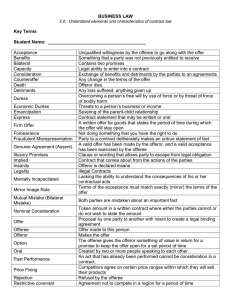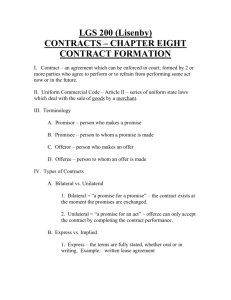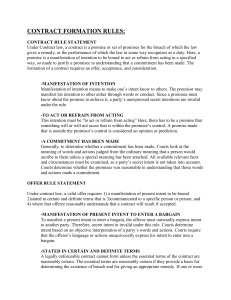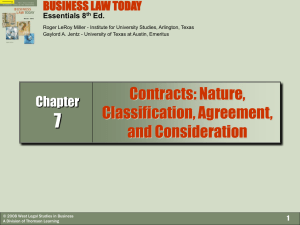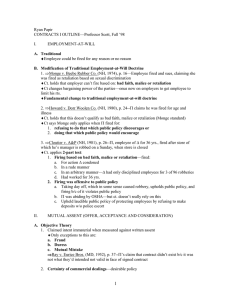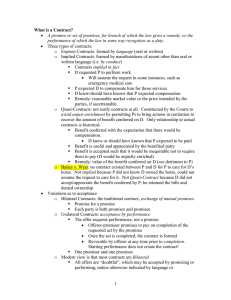Chapter 6 Contracts: Nature, Classification, Agreement and
advertisement
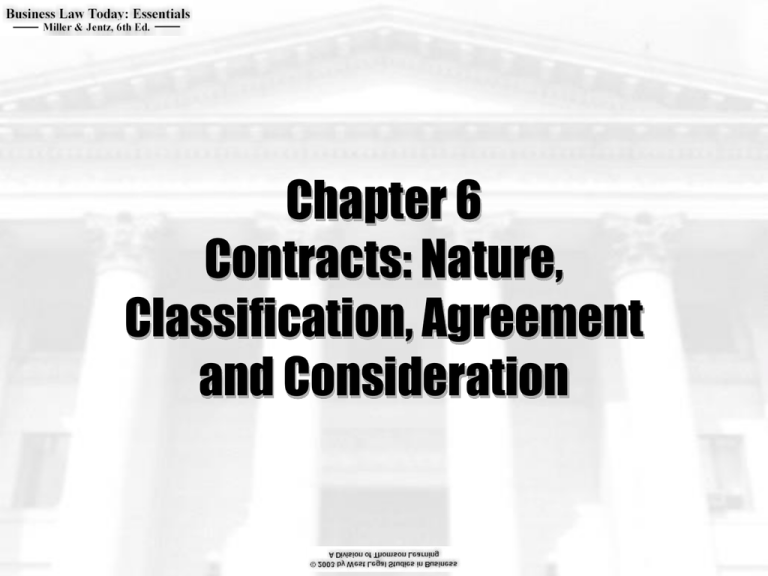
Chapter 6 Contracts: Nature, Classification, Agreement and Consideration Learning Objectives What is a contract? What is the objective theory of contracts? What are the four basic elements of a valid, enforceable contract? What are the various classifications of contracts? What are the requirements of an offer? How can an offer be accepted? What are the elements of consideration? Contracts Function of Contracts Fundamental to business. Creates rights and duties between parties. Provides stability and predictability. Parties: Promisor (makes the promise) and Promisee (accepts the promise). Good faith in commercial agreements Contracts Definition of a Contract Agreement that can be enforced in court. Formed by two or more parties Failure to perform results in breach and damages. Objective Theory Reasonable person standard Circumstances surrounding contract formation Requirements of a Contract A valid, enforceable contract includes: Agreement Consideration Capacity Legality Defenses to formation include: Genuineness of Assent Form Types of Contracts Every contract has at least 2 parties: the Offeror (Promisor) and the Offeree (Promisee). Bilateral Contracts Offeror and Offeree exchange promises to each other. A contract is formed when Offeree promises to perform. Types of Contracts Unilateral Contracts Offeror wants performance in exchange for his promise. Contract is formed when Offeree performs. Contests and lotteries are examples. Revocation of Offer: modern view is that offer is irrevocable once the Offeree substantially performs. Types of Contracts Express vs. Implied Contracts Express: terms of contract are set forth either in writing or orally. Implied-in-Fact: based on conduct. • Plaintiff furnished service or product • Plaintiff expects to be compensated • Defendant had a chance to reject and did not. Implied-in-Law (Quasi Contract) • Fictional, created by court to avoid unjust enrichment. Types of Contracts Formal vs. Informal Contracts Formal: require special form or method to be enforceable, e.g., under seal. Informal: all other contracts. Executed vs. Executory Contracts Executed: fully performed by both sides. Executory: at least one of the parties has not performed. Types of Contracts Valid Contract Four Elements: Agreement, Consideration, Legal Purposes, Parties have legal capacity. Voidable Contract Valid contract that is legally defective and can be avoided (rescinded) by one of the parties. Void Contract No contract at all. Agreement: Offer Agreement = Offer and Acceptance. An offer is the Offeror’s promise to perform. An offer requires: Serious, objection intention • Opinions are not offers • Good Intentions are not offers • Preliminary Negotiations are not offers • Agreements to Agree are not offers Offer An offer requires (continued): Reasonably definite terms Communication to Offeree Termination of Offer By Act of the Parties Revocation by Offeror (unless irrevocable) Rejection by Offeree (or counteroffer) Operation of Law (destruction, death) Agreement: Acceptance Voluntary act by Offeree that shows assent to terms of original offer. Unequivocal Acceptance: “Mirror Image” Rule Offeree must unequivocally accept offer. Additional terms may be considered a counteroffer. Acceptance by Silence Acceptance Communication of Acceptance Authorized Means of Communication is either express or implied by form of offer (e.g., U.S. mail, fax, email) “Mailbox Rule”: Offeree accepts offer when the acceptance is dispatched to Offeror in the form it was received, unless offer requires a different method (e.g., Fed-Ex, or receipt by Offeror). Consideration Consideration is value given in return for a promise. Elements: Something of legally sufficient value given in exchange for a promise and A bargained-for-exchange between the parties. Adequacy of Consideration Contracts that Lack Consideration Pre-Existing Duty Unforeseen Difficulties Past Consideration Illusory Promises Settlement of Claims Accord and Satisfaction Release Covenant Not to Sue Promises Enforceable Without Consideration Promissory Estoppel Promissory Estoppel (“detrimental reliance”) doctrine applies when a person relies on the promise of another to her legal detriment. Promisor is “estopped” (precluded) from revoking the promise. There must be: • Clear and definite promise with substantial reliance • Justice is served by enforcement of the promise.


